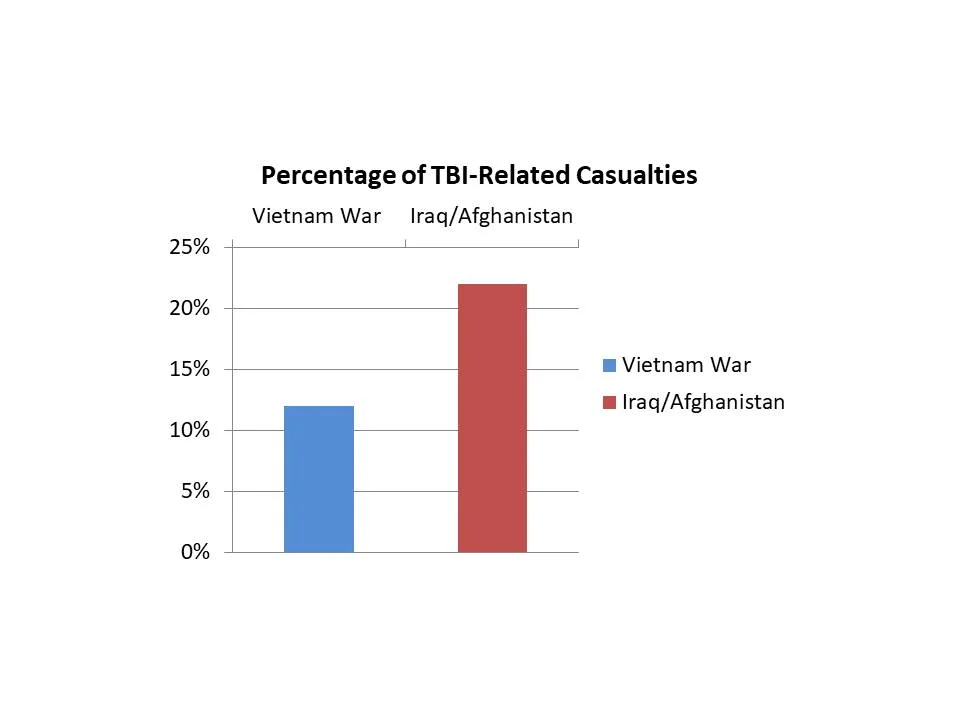24,000 Veterans Examined for Traumatic Brain Injury by Unqualified VA Examiners Between 2007 and 2015
Traumatic Brain Injury ("TBI") has been referred to as the signature injury of the conflicts in Afghanistan and Iraq. DoD estimates that 22% of all casualties from Afghanistan and Iraq were TBIs, a 10% increase since Vietnam.
Despite the uptick in frequency, brain injuries remain poorly understood. Sure, progress is being made. Yes, there's a seemingly ever-expanding body of TBI-related medical literature. The problem is that brain-related medical science is both complex and increasing rapidly. Unlike many conditions that general practitioners can readily diagnose, there isn't some systematic process like a swab or blood test to diagnose a TBI. The gold standard is an examination by a trained TBI specialist who considers all of an individual's unique symptoms and circumstances.
That's where the VA messed up.
The VA recognized that only a specialist can provide a reliable TBI diagnosis over a decade ago, adopting a policy that only psychiatrists, physiatrists, neurosurgeons, and neurologists are qualified to provide initial TBI examinations to veterans. Despite that policy, unqualified VA doctors (and in some instances nurse practitioners) provided an estimated 24,000 veterans with TBI medical examinations between 2007 and 2015.
What does that mean for veterans who were examined for a TBI by unqualified medical professionals between 2007 and 2015?
In an attempt to address the problem, VA Secretary McDonald granted equitable relief in May 2016 to all of the roughly 24,000 veterans who were examined for TBIs by unqualified medical professional between 2007 and 2015.
In response, the VA apparently sent out letters to all of the veterans that it identified as being examined by an unqualified medical professional. In those letters, the VA explained that impacted veterans had one year to request a new examination and have their claim reprocessed without needing to submit a new claim. That meant that if a new examination by a specialist revealed a TBI, the originally misdiagnosed veteran was entitled to back pay beginning as early as the date on which initial TBI claim was filed.
Here's the thing...
The VA states that approximately 13,000 of the 24,000 veterans initially examined by an unqualified medical professional have since been awarded benefits for TBI. While it's great that 13,000 mistakes have been corrected, it also means that over fifty percent of veterans examined by unqualified medical professionals were originally misdiagnosed. That figure may even be higher if a significant number of veterans have not yet been re-examined.
Takeaways
- The one year period for a new examination has since expired for any veteran who received notification via mail, but veterans who did not receive notification may still be entitled to an examination and having their claim reprocessed.
- Even if a veteran does not qualify for equitable relief, it is still time to consider getting a new TBI examination and appealing or reopening a TBI claim if the initial TBI examination was not completed by a psychiatrist, physiatrist, neurosurgeon or neurologist.
- Regardless of whether a veteran's TBI examination was conducted by a specialist, TBI-related medical science is rapidly evolving and it may be time to get a second, independent opinion by a specialist outside of the VA.
RELATED: Your Guide to Winning Your TBI Claim
To learn more about TBIs, including signs, symptoms, related conditions, and what is required to obtain compensation, click here.
While we're on the topic, check out Dr. Gordon's groundbreaking work on TBIs and hormone deficiency over at the Warrior Angels Foundation.


